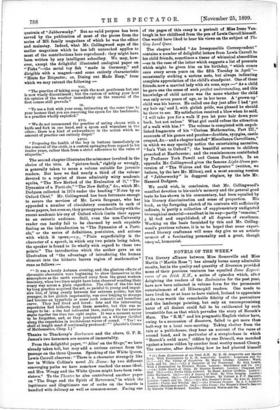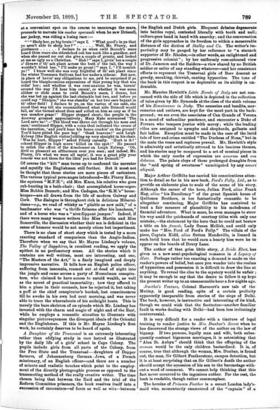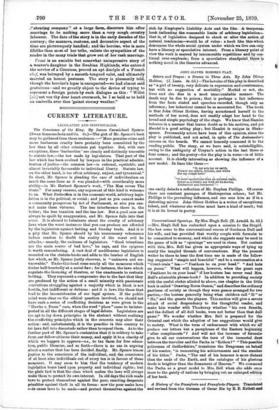NOVELS OF THE WEEK.*
THE literary alliance between Miss Somerville and Miss Martin (" Martin Ross ") has already borne many admirable results, but in the quality and quantity of diversion provided none of their previous ventures has equalled Some Experi- ences of an Irish R...11, a series of episodes which, afttv delighting the readers of the Badminton for the past year, have now been collected in volume form for the permanent entertainment of all Hibernophil readers. One needs to have lived in, or at least to have visited, Ireland to appreciate at its true worth the remarkable fidelity of the portraiture and the landscape painting, but only an uncompromising hater of all dialect could fail to be exhilarated by such irresistible fun as that which pervades the story of Bocock's Mare. The " R.M." and his pragmatic English visitor have, owing to a succession of disasters, failed to get more than half-way to a local race-meeting. Taking shelter from the rain at a pnblichouse, they hear an account of the races at second hand, and in particular of a steeplechase in which " Bocock's owld mare," ridden by one Driscoll, was matched against a horse ridden by another local worthy named Clancy. The narrator, after describing how he had planted himself • (1.) Some Experiences of an Irish B.M. By E. CE. Somerville and Martin ROST, With Illustrations by E. (E. Somerville. London : Longmans and Co. [5i.)—(2.) The Valley of Sapphires. By Mayne Lindsay. London : Ward, hock, and Co. [6s.]—(3.) A Daughter of the Transvaal. By Alys Lowth. With 4 Illustrations by Florence Holum. London : Hutchinson and Co. [5s.) —(4.) Little Novels of Italy. By Maurice Hewlett. London : Chapman and Hall. [6s.)—(5.) Ford's Folly, Limited. By Major Arthur Griffith,. London : John 5IacQueen. [6s.]—(6.) A Legacy of Hate. By Theo Douglas. London : C. A. Pearson. [6s.]—(7.) Jenetha's Venture. By Colonel A. P. P. Harcourt. London : Cassell and Co. [68.]—(8.) Mrs. Dunbar's Secret. By Alan St Aub3m. London : Chatto and \Violins. [6s.]—(9.) Princess Feather. By A. C. Inchbold. London : Hutchinson and Co. [6s.]—(10.) Prowl: The Weaver's Heart's Dearest. By Blanche Willis Howard. London : Frederick Warne and Co. Dal at a convenient spot on the course to encourage the mare, proceeds to narrate his modus operandi when be saw Driscoll, her jockey, was riding a losing race:— Skelp her, ye big brute !" says I. "What good's in ye that
ye aren't able to skelp her ? " Well, Mr. Flurry, and gintlemen I declare to ye when owld Bococlr's mare
heard thim roars she sthretched out her neck like a gandher, and when she passed me out she give a couple of grunts, and looked at me as ugly as a Christian. " Hah !" says I, givin' her a couple o' dhraws o' th' ash plant across the butt o' the tail, the way I wouldn't blind her, "I'll make ye grunt !" says I, "I'll nourish ye !" I knew well she was very frightful of th' ash plant since the winter Tommeen Sullivan had her under a sidecar. But now, in place of havin' any obligations to me, ye'd be surprised if ye heard the blaspheemious expressions of that young boy that was ridin' her ; and whether it was over-anxious he was, turnin' around the way I'd hear him cursin', or whether it was some slither or slide came to owld Bocock's mare, I dunno, but she was bet up against the last obstackle but two, and before ye could say " Shnipes," she was standin' on her two ears beyant in th' other field ! I declare to ye, on the vartue of me oath, she stood that way till she reconnoithered what side Driscoll would fall, an' she turned about then and rolled on him as cosy as if he was meadow grass ! ' Slipper stopped short ; the people in the doorway groaned appreciatively ; Mary Kate murmured 'The Lord save us ! The blood was dhruv out through his nose and ears,' continued Slipper, with a voice that indicated the cream of the narration, and you'd hear his bones crackin' on the ground ! You'd have pitied the poor boy.' 'Good heavens !' said Leigh Kelway [the English visitor] sitting up very straight in his chair. Was he hurt, Slipper ?' asked Flurry casually. 'Hurt is it ? ' echoed Slipper in high scorn 'killed on the spot ! ' He paused to relish the effect of the dc'noaement on Leigh Kelway. 'Oh, divil SO pleasant an afthernoon ever you seen ; and indeed, Mr. Flurry, it's what we were all sayin', it was a great pity your honour was not there for the likin' you had for Driscoll.'"
Of course the " kilt " man turns up to confound the narrator and mystify the Englishman still further. But it must not be thought that these stories are mere pieces of caricature. The various typical personages introduced—Mr. Flurry Knox, the squireen "M.F.H."; old Mrs. Knox, his relative who goes cub-hunting in a bath-chair ; that accomplished horse-coper, Miss Bobbie Bennett; and Mrs. Cadogan, the "R.M.'s" house- keeper—are all drawn from the life of modern Galway and
Cork. The dialogue is throughout rich in delicious Hiberni- 318MS—e.g., we read of whisky as "pliable as new milk," of a
bandmaster who was "a thrifle fulsome after his luncheon," and of a horse who was a "nice flippant jumper." Indeed, if there were many women writers like Miss Martin and Miss Somerville, the discussion whether their sex is deficient in the sense of humour would be not merely otiose but impertinent.
There is no class of short story which is tested by a more exacting standard of comparison than the Anglo-Indian. Therefore when we say that Mr. Mayne Lindsay's volume,
The Valley of Sapphires, is excellent reading, we apply the epithet in no perfunctory sense. All the stories which it contains are well written, most are interesting, and one, 'The Masters of the Art," is a finely imagined and deeply impressive narrative. It tells how an English police officer, suffering from insomnia, roamed out at dead of night into
the jungle and came across a party of Mussulman conspira- tors, who claimed to have access to untold wealth, as well as the secret of practical immortality ; how they offered to him a plaee in their counsels, how he rejected it, but taking a puff at the chief conspirator's hookah, lost consciousness till he awoke in his own bed next morning, and was never able to trace the whereabouts of his midnight hosts. This is
merely the bare skeleton of an episode which Mr. Lindsay has invested with the charm and magic of night and of the East,
while he employs a romantic situation to illustrate with singular picturesqueness the divergent ideals of the Oriental and the Englishman. If this is Mr. Mayne Lindsay's first work, he certainly deserves to be heard of again.
A Daughter of the Transvaal is an extremely interesting rather than edifying study in race hatred as illustrated
by the daily life of a girls' school in Cape Colony. The pupils include girls from all parts of the Colony, from the Free State and the Transvaal— daughters of Dopper farmers, of Johannesburg German - Jews, of a French missionary, of an English officer—and there are a number of minute and realistic touches which point to the employ- ment of the directly photographic process as opposed to the transmuting method of the really creative writer. The time chosen being that between the Raid and the trial of the Reform Committee prisoners, the book resolves itself into a succession of encounters—of force as well as wits—between
the English and Dutch girls. Eloquent debates degenerate into battles royal, contested literally with tooth and nail ; culture goes hand in hand with anarchy; and the conversation of the girls approaches in its freedom to within a measurable distance of the diction of Stalky and Co. The writer's im- partiality may be ganged by her reference to " a staunch supporter of Mr. Rhodes,—in other words, an enlightened and progressive colonist" ; by her uniformly rose-coloured view of Dr. Jameson and the Raiders—a view shared by no British soldier or sailor of any standing whatever—and her consistent efforts to represent the Transvaal girls of Boer descent as greedy, sneaking, thievish, canting hypocrites. The tone of the book in this respect is as deplorable as its ability is un- deniable.
Mr. Maurice Hewlett's Little Novels of Italy are not con- cerned with the side of life which is depicted in the collection of tales given by Mr. Symonds at the close of the sixth volume of his Renaissance in Italy. The assassins and bandits, mer- cenaries and outlaws, are kept for the most part in the back- ground ; we see even the associates of Can Grande of Verona in a mood of unfamiliar penitence, and encounter a Duke of Ferrara who tempers justice with mercy ; while the leading roles are assigned to nymphs and shepherds, gallants and fair ladies. Exception must be made in the ease of the lurid tale of love and crime entitled "The Duchess of Nona," but in the main the roses and raptures prevail. Mr. Hewlett's style is admirably and artistically attuned to his luscious themes, and his stories may be compared to a set of musical pieces in which the only marks of expression are anwroso and con dolcezza. The palate cloys of these prolonged draughts from the "mid spring of sweetness" unmitigated by any anwri aliquid.
Major Arthur Griffiths has carried his conscientious atten- tion to detail so far in his new book, Ford's Folly, Ltd., as to provide an elaborate plan to scale of the scene of his story. Although the career of the hero, Julian Ford, alias Frank Hay, alias "his Excellency" of the great Spanish house of Quinones Brothers, is too fantastically romantic to be altogether convincing, Major Griffiths has contrived to lend a fair measure of plausibility to his melodrama of financial adventure. What is more, he even manages to steer his way amid the quicksands of courtesy titles with only one mistake,—the statement by the hero that he could not bestow a title on his fiancee, Lady Susan Mellish, and could only make her "Mrs. Ford of Ford's Folly." The villain of the piece, Captain Kidd, alias Sutton Mandeville, is limned in such lurid hues that he would earn a hearty hiss were he to appear on the boards of Drury Lane.
The author of that grim little story, A Bride Elect, has given us a new semi-psychological romance in A Legacy of Hate. Perhaps rather too exacting a demand is made on the reader's powers of belief, but once you wander into the realms of hypnotism and possession it is difficult to draw the line at anything. To reveal the clue to the mystery would be unfair ; it may be enough to say that the desire to follow it up kept the present writer up to an unseasonable hour a few nights ago.
Jenetha's Venture, Colonel Harcourt's new tale of the Mutiny, is good reading, spite of a certain prolixity apparently inseparable from stories of the siege of Delhi. The book, however, is instructive and interesting of its kind, though we could wish that the footnotes—another familiar fault in works dealing with Delhi—had been less irritatingly controversial.
It is very difficult for a reader with a tincture of legal training to render justice to Hrs. Dunbar's Secret when he has discovered the strange views of the author on the law of bigamy. If two persons, legally man and wife, both subse- quently contract bigamous marriages, it is astonishing that "Alan St. Anbyn" should think that the offspring of the woman would be the only children bastardised. It is, of course, true that although the woman, Mrs. Dunbar, is found out, the man, Sir Gilbert Featherstone, escapes detection, but it is at least surprising that on Sir Gilbert's death the author should accept the accession of his son to the baronetage with- out a word of comment. We cannot help thinking that this fact never occurred to the ingenious author. For the rest, the book is readable, though rather commonplace.
The heroine of Princess Feather is a smart London lady's. maid who, momentarily enamoured of the "captain" of a ,!`sheariag company" at a large farm, discovers him after ;marriage to be nothing more than a very rough country labourer. The date of the story is in the early decades of the century ; the manners, customs, and decorative aspect of the .time are picturesquely handled ; and the heroine, who is more lifelike than most of her tribe, enlists the sympathies of the :reader in the many trials that grow out of her rash marriage.
Vroni is an amiable but somewhat unimpressive story of a weaver's daughter in the Swabian Highlands, who entered the service of a Countess, proved an apt disciple of a French chef, was betrayed by a smooth-tongued valet, and ultimately married an honest postman. The story is pleasantly told, though the heroine's lapse is unexpected—we had almost said gratuitous—and we greatly object to the device of trying to represent a foreign patois by such dialogue as this : " Willst Did not vex thy dear heart overmuch, be I so bold as to hold an umbrella over thee 'gainst stormy weather."












































 Previous page
Previous page